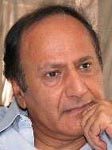Shujaat’s statement has Pak experts divided over US support to Musharraf

Lahore, Oct 6 : Our hearts are with Osama and brains with Musharraf, an expert has quoted ruling Pakistani Muslim League (PML) president Shujaat Hussain, as saying.
The above statement has created a rift among experts over the issue of continued American support to President Pervez Musharraf.
Two Pakistani experts, Hassan Abbas, a research fellow at Harvard’s Kennedy School of Government, and Moeed Yusuf, Director of strategic studies at the Islamabad-based think tank Strategic and Economic Policy Research, have debated this issue on the Council on Foreign Relations website.
“General Musharraf can’t fool all the people, all the time by claiming that ‘after me, the deluge. He artfully projects that he alone stands between Pakistan and a mullah takeover of the state,” writes Hassan Abbas.
“General Ayub Khan, Pakistan’s first military dictator in the 1960s, earned US support by claiming that he was an obstacle to the communist expansionist designs in the region. General Zia-ul Haq converted the Afghan freedom fight into an international Jihad (aided and abetted by the CIA and Saudi Arabia) during the Soviet occupation of Afghanistan in the 1980s. Ayub’s rule led to the break up of Pakistan, and Zia’s policies brought upon us the modern face of religious extremism among Muslims in Central and South Asia. Also, strangely, Musharraf framed his overall policy as “Enlightened Moderation” - an English language phrase that is not even easily translated into local languages in Pakistan,” he added.
Musharraf has idealised Mustafa Kemal Ataturk, the army general who created the modern Turkish Republic, Hassan said, adding, he had not read history books.
“For instance, just see the profiles of his top political allies. Shujaat Hussain, president of the Pakistan Muslim League (Quaid) ... is on record having said that ‘our hearts are with Osama and brains with Musharraf’,” the Daily Times quoted, him, as saying.
Commenting on the issues pertaining to terrorism, Hassan writes that the Taliban insurgency in FATA can still be tackled with a mix of 20 percent military action and 80 percent political measures.
He further says that the US will seriously re-evaluate its war on terror-driven policies, including its support to Musharraf.
On the other hand, Moeed Yusuf writes, “I am amused to see Hassan hedging his bets by stating, ‘the real problem is the blind US support for Musharraf and reluctance to even softly criticize his blunders.’ If that were the only concern, then I would completely agree with him. The US must judiciously criticise Musharraf for his increasing heavy-handedness against the political and civil opposition. But, this does not require the US to withdraw support for Musharraf.”
Responding to Hassan’s argument that mainstream political parties would have managed to subdue the opposition in the FATA, Moeed writes that “I shall let that stand since it is a redundant claim. Note Hassan’s extremely careful choice of words to make this point; the past tense suggests his realisation that no political outfit can alter the scenario under the current circumstances. Since we are discussing the present, even if he is right, the situation in 2002 is no longer relevant”.
Moeed suggests that Washington has every reason to doubt the civilian enclave’s ability to improve Pakistan’s performance on the terrorism front.
The Pakistan army will continue to dictate the FATA policy with or without Musharraf, he adds.
“Under the current circumstances it is utopian to expect the US to disregard its compulsions in the war on terror and seek to support civilian rule in Pakistan. And as for US public support for free and fair elections in Pakistan, there is enough evidence from across the globe - Palestine, Algeria, Turkey being pertinent examples - to suggest that while the US’ normative stance forces it to make such statements, these are hollow claims that only take effect if Washington deems an election to be in its interest,” Moeed writes. (ANI)